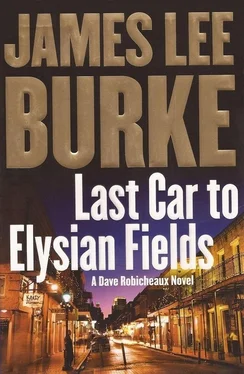“I need to go to confession, Father,” the voice said.
“Reconciliation is scheduled every afternoon at four, except Sundays,” he said.
“I need to go now.”
Father Jimmie looked over his shoulder at a quarterback completing a thirty-yard pass on the television screen.
“Can it wait?” he asked.
“I have to get something of a serious nature off my conscience.”
In the silence Father Jimmie could hear die man breathing into the receiver. “I’ll be in the confessional at four o’clock,” he said.
He finished his sandwich in front of the television, and a half hour later walked down the center aisle of the church toward the three confessionals that were inset in a side wall at the rear of the building. The inside of the church was magnificent. Twin balconies draped with brilliant red tapestries extended all the way from the choir to the altar area. The pulpit was hand-carved from teak wood and had been constructed high above the laity, in a time when there were no microphones to magnify the minister’s voice. Whenever the sunlight struck the stained-glass windows, the effect inside the church was stunning. The celestial scenes on the ceiling and the paintings depicting Christ’s passion in the Garden of Gethsemane and his ordeal by scourge and mockery and spittle and finally crucifixion made the viewer swallow in both reverence and trepidation.
The front doors of the church were open, and Father Jimmie could see the grayness of the afternoon out on the street and the drabness of the neighborhood and the rainwater welling up from the storm sewers.
Perhaps a dozen people were in the pews, all of them old, their clothes shabby, their rosary beads wrapped around their hands. Some nodded at him and smiled as he passed. Their faith was genuine, he thought, their level of devotion long since proven by the lives they had led, but if they did not have this place to visit, where they could say their beads and confess sins that were either imaginary or inconsequential, he knew they would have no lives at all.
A homeless man slept in a back pew, curled up in a fetal position, his odor rising from his clothes like a living presence. A bottle of fortified wine had fallen from his coat pocket and was precariously balanced on the edge of the pew.
Father Jimmie picked it up, tightened the cap, and placed it on the floor, within arm’s reach of the sleeping man.
Then, on the far side of the church, he saw a man he had never seen before. The man wore a tight-fitting tan raincoat buttoned to his neck, like a prison on his body. His face was beaded with water, his ears like small cauliflowers, his hair cut short, combed neatly, reddish in color. He was sitting rather than kneeling, his hand resting on a domed, black lunch box. His eyes never made contact with Father Jimmie’s.
Father Jimmie went into the vestibule of the church and smelled the wind and rain and leaves blowing in the street. He wished he had not answered the phone in the rectory. It was a gray, wet day, with a touch of winter in the air, but it reminded him of Kentucky in the late fall, just before Advent, when a great dampness would settle on the Cumberland Mountains and the color would drain out of the sky and the fields and the leaves of the hardwoods would turn to flame in the hollows. It should have been a day to watch football and eat soup and hot bread and perhaps jog in Audubon Park. But he could not refuse a request for reconciliation, no matter how neurotic, self-absorbed, or irritating the source was.
He opened the door to a side corridor that led to the back entrance of a confessional, placed his stole around his neck, and sat down inside.
He heard someone open the door to the adjoining box and the person’s weight depress the kneeler that was attached to the partition separating the penitent from the confessor. Father Jimmie pushed back the wood slide that covered the small, grilled, gauze-covered window through which the penitent, in this case a man who smelled of street damp and hair tonic, would make his confession.
But the man did not speak.
“Are you the gentleman who called the rectory?” Father Jimmie asked.
“That I am, Father.”
“What is it you’d like to tell me?”
Father Jimmie could see the outline of the man’s head. The ears looked like they had been carved around the edges with a paring knife. He heard the man snuff down in his nose and shift his weight on the kneeler.
“Been a while since I’ve visited one of these,” the man said.
“Yes?”
“I’m a bit flummoxed. Hold on a bit, Father, while I organize my thoughts.”
Father Jimmie heard what he thought was the man’s lunch box clattering open inside the confessional. “What are you doing in there?” he asked.
“Nothing.” The man was breathing hard now. “I met a Catholic sister on the train. I was rude to her. She’s a friend of yours. So I apologize for that.”
“Oh, you’re the fellow. Well, she already called me. I’ll pass on your apologies. Is that it?”
“I scared the shite out of her. She tell you that?”
“Don’t do it anymore and it won’t be a problem. Is that all you have to tell me. Because if it is “
“No, it is fucking not, sir.”
“ What did you say?”
The man was breathing hard through his nose now, a ray of light from outside the confessional glimmering on the planed surfaces of his face.
“I said give me a fucking minute, if you please,” he said.
“Are you drunk?”
The man did not reply. He seemed to burn with energies he couldn’t express. He rocked on the kneeler and twisted his head from side to side, then made a grinding noise in his throat. The lunch box clattered with sound again, as though the man had dropped a heavy object in it and snapped the latch on the lid.
“Tell the nun she’s a splendid woman and I hope she lives long enough to have a bishop for a son. Send up a thanks to your patron saint, Father. Maybe buy a Powerball ticket while you’re at it,” the man said.
He flung open the door of the confessional and stalked through the vestibule and out the front of the church. Father Jimmie followed him as far as the front steps and watched him walk toward Canal, a golfer’s cap pulled down on his head, his narrow shoulders hunched forward in the rain, his lunch box glistening with moisture. The man looked back over his shoulder at Father Jimmie, his face contorted, as though he had just fled a burning building.
It had rained through the night in New Iberia, and in the morning the sun rose like a pink wafer out of a blanket of fog that covered the cane fields. When I got to the office the parents of Lori Parks were waiting for me. Sometimes the survivors of family members who meet violent deaths have no place to direct their anger and loss other than at the police officer who is assigned to help them. Their rage is understandable, particularly when a cop is straight up and informs them the percentages are not in favor of justice being done. But sometimes the anger of the survivors has more to do with guilt than grief.
The father was sandy haired and tall, with an aquiline nose, the tops of his forearms sun freckled, his hands long and tapered. The wife was built like a stump, a ring of fat under her chin, her hair dyed dark red, her perfume a chemical fog.
“I hear you’re questioning the employees of the daiquiri shops in town,” the father said.
“Yes, sir, that’s correct,” I said.
He and his wife had not taken a seat when I offered them one. They looked down at me, from across my desk, stolid, angry, their defenses and denial rooted in concrete.
“Are you saying our daughter was DWI?” he asked.
“That’s the conclusion of our lab.”
He nodded silently, the color in his eyes deepening, the skin around the rim of his nostrils whitening.
Читать дальше












